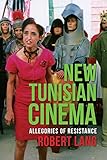New Tunisian Cinema : Allegories of Resistance / Robert Lang.
Material type: TextSeries: Film and Culture SeriesPublisher: New York, NY : Columbia University Press, [2014]Copyright date: ©2014Description: 1 online resource (448 p.) : ‹B›B&W Photos: ‹/B›44Content type:
TextSeries: Film and Culture SeriesPublisher: New York, NY : Columbia University Press, [2014]Copyright date: ©2014Description: 1 online resource (448 p.) : ‹B›B&W Photos: ‹/B›44Content type: - 9780231165075
- 9780231537193
- 791.4309611 23
- PN1993.5.T75 L36 2014
- PN1993.5.T75 L36 2015
- online - DeGruyter
- Issued also in print.
| Item type | Current library | Call number | URL | Status | Notes | Barcode | |
|---|---|---|---|---|---|---|---|
 eBook
eBook
|
Biblioteca "Angelicum" Pont. Univ. S.Tommaso d'Aquino Nuvola online | online - DeGruyter (Browse shelf(Opens below)) | Online access | Not for loan (Accesso limitato) | Accesso per gli utenti autorizzati / Access for authorized users | (dgr)9780231537193 |
Browsing Biblioteca "Angelicum" Pont. Univ. S.Tommaso d'Aquino shelves, Shelving location: Nuvola online Close shelf browser (Hides shelf browser)

|

|

|

|

|

|

|
||
| online - DeGruyter Head Cases : Julia Kristeva on Philosophy and Art in Depressed Times / | online - DeGruyter Lady in the Dark : Iris Barry and the Art of Film / | online - DeGruyter Losing Tim : How Our Health and Education Systems Failed My Son with Schizophrenia / | online - DeGruyter New Tunisian Cinema : Allegories of Resistance / | online - DeGruyter Reading The Tale of Genji : Sources from the First Millennium / | online - DeGruyter Mad Mothers, Bad Mothers, and What a "Good" Mother Would Do : The Ethics of Ambivalence / | online - DeGruyter Guilty Knowledge, Guilty Pleasure : The Dirty Art of Poetry / |
Frontmatter -- Contents -- Preface -- Acknowledgments -- Chapter One. The nation, the State, and the Cinema -- Chapter Two. "The freedom to be different, to choose your own life": Man of Ashes (Nouri Bouzid, 1986) -- Chapter Three. Laughter in the dark: Sexuality and the Police State in Halfaouine (Férid Boughedir, 1990) -- Chapter Four. Sexual allegories of national identity: Bezness (Nouri Bouzid, 1992) -- Chapter Five. The Colonizer and the Colonized: The Silences of the Palace (Moufida Tlatli, 1994) -- Chapter Six. "it takes two of us to discover truth": Essaïda (Mohamed Zran, 1996) -- Chapter Seven. "It takes a lot of unruly individuals to make a free people": Bedwin Hacker (Nadia el Fani, 2002) -- Chapter Eight. Inventing the Postcolonial nation/Constructing a usable Past: The TV Is Coming (Moncef Dhouib, 2006) -- Chapter Nine. "Destiny answers the people's call for life, darkness will be dispelled, and chains will break" -- Notes -- Filmography -- Glossary -- Bibliography -- Index -- Backmatter
restricted access online access with authorization star
http://purl.org/coar/access_right/c_16ec
Tunisian cinema is often described as the most daring of all Arab cinemas. For many, Tunisia appeared to be a model of equipoise between "East" and "West," and yet, during Zine El Abidine Ben Ali's presidency, from 1987 to 2011, the country became the most repressive state in the Maghreb. Against considerable odds, a generation of filmmakers emerged in the mid-1980s to make films that are allegories of resistance to the increasingly illiberal trends that were marking their society.In New Tunisian Cinema, Robert Lang focuses on eight films by some of the nation's best-known directors, including Man of Ashes (1986), Bezness (1992) and Making Of (2006) by Nouri Bouzid, Halfaouine (1990) by Férid Boughedir, The Silences of the Palace (1994) by Moufida Tlatli, Essaïda (1997) by Mohamed Zran, Bedwin Hacker (2002) by Nadia El Fani, and The TV Is Coming (2006) by Moncef Dhouib. He explores the political economy and social, historical, and psychoanalytic dimensions of these works and the strategies filmmakers deployed to preserve cinema's ability to shape debates about national identity. These debates, Lang argues, not only helped initiate the 2011 uprising that ousted Ben Ali's regime but also did much to inform and articulate the aspirations of the Tunisian people in the new millennium.
Issued also in print.
Mode of access: Internet via World Wide Web.
In English.
Description based on online resource; title from PDF title page (publisher's Web site, viewed 02. Mrz 2022)


